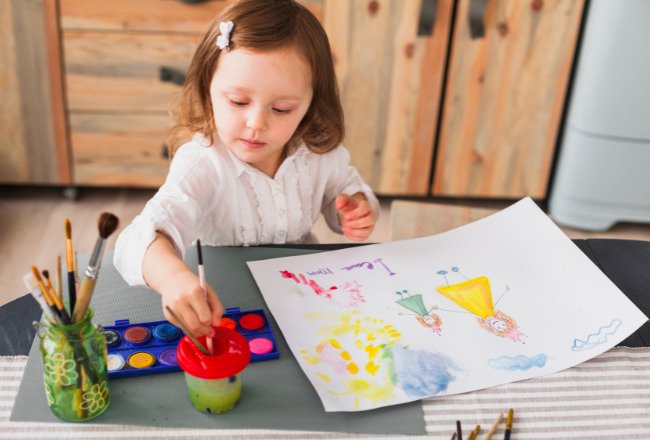19 Psychological Benefits Of Storytelling that we learned as a Child.

Remember the TV show Krish, Trish, and Baltiboy from the good old Cartoon Network? That cat, money, and the donkey telling us so many folktales using Indian Traditional Art Forms? Remember how much you enjoyed it?
"
In This article will tell you about the 18 tremendous benefits of storytelling.
Let's dive right in..
- Table of Content
- Storytelling creates Curiosity
- Storytelling can help you to expand your horizons
- Storytelling helps to overcome Life challenges
- You can always Learn To Listen to via Storytelling
- Storytelling helps to Develop an interest in Reading
- Storytelling helps you to Communicate better
- Storytelling Has a Stronger Effect on Our Minds
- Storytelling helps to enhance Memory
- Storytelling helps you build your Vocabulary
- Via Storytelling you can Cover the Whole Curriculum
- You Understand Society well because of Storytelling
- Storytelling helps to build Creative mind
- Storytelling is all Fun
- Storytelling act As Stimulants
- Storytelling helps to Boost Confidence
- Storytelling helps to build Thinking Skills
- Your Attention Skills gets finer via Storytelling
- Storytelling are great form of Escapism
- Storytelling Provides Hope
Remember the TV show Krish, Trish, and Baltiboy from the good old Cartoon Network? That cat, money, and the donkey telling us so many folktales using Indian Traditional Art Forms? Remember how much you enjoyed it?
I remember all the stories that my grandmother told us to put us to sleep. While all of them started with, “Long, long ago, there lived a King.” Each of the stories has a moral lesson at the end. Each ended with a valuable lesson I had learned.
I almost would not let my grandmother sleep until she told me stories. Soon enough, my mother bought me books because she couldn’t tell stories as brilliantly as my grandmother.
Storytelling can genuinely change our lives. So we listed below the 18 benefits of Storytelling.
So, let's begin
1. Storytelling creates Curiosity
The first thing is,
In many ways, Curiosity underpins learning. Children want to know more because they are curious.
The most important thing is to start with Curiosity!
One of the best ways to pique interest is through stories.
Children are interested in learning about the characters’ actions. They catch wind of a fascinating spot like a spooky place and need to find out about it.
Everybody needs to know the solution to this important question…
what occurs straightaway?
This Curiosity is developed early in a child’s life through stories. It creates a shared experience with adults and is colorful. Even very young children find physical books very interesting when exposed to them. Later, they enjoy hearing about fantastic beings speaking in various languages, distant lands, and unique adventures.
Children are also encouraged to be imaginative and use their imaginations to imagine the story’s settings, characters, and plot. Children can create a world of stories rather than watching a movie and translating pictures into words.
Curiousness and learning stimulation go hand in hand.
2. Storytelling can help you to expand your horizons.
Stories are one of the best ways to inspire young children to have goals
Stories are particularly beneficial.
The Panchatantra Stories is a book with ideas that expand horizons and teach important lessons. The Panchatantra wrote by Pandit Vishnu Sharma in 200 BCE to teach little children moral lessons quickly without complicating them. Some of the stories are listed below:
- Victory Over Adversity
- Understanding How to Overcome Obstacles with a Little Resilience
- Problem-Solving Experience
- Learning How To Make The Difference Between Good and Bad
- Knowing What Good Friends And Bad Friends Are
Storytelling shows us several shades within them: the hero, the villain, and all the characters in between.
3. Storytelling helps to overcome Life challenges
Life, all by itself, is a struggle
We witness a wide range of horrible events in the books, including the sinking of ships, the destruction of homes, the use of terrible spells by witches, and so on.
But is the hero going to lie down and let it happen? Not!
There are a lot of flawed characters in the book who fight the good guys and never die.
This resilience is depicted in numerous stories but is not an attitude. Show kids how to start with a problem and try to solve it.
Children are given windows into new worlds through storytelling. They gain actual life examples without acknowledging them from paying attention to sensational and energizing stories. It enables me to acquire fresh concepts and information.
4. You can always Learn To Listen to via Storytelling
This is a significant issue today
One such factor is the rise of Japanese pop culture, which has gained a strong foothold in India in recent years. Japanese pop culture, including Anime, manga, and video games, has become increasingly popular among Indian youth, with many fans embracing Japanese fashion, music, and entertainment. worldwide.
5. Storytelling helps to Develop an interest in Reading
This is how it functions
What begins with oral storytelling eventually leads to reading.
Children who do well in reading and writing often believe their success is due to their excellent memory or enjoyment of phonics. This might be significant, yet kids who need to peruse frequently learn all the more unhesitatingly. If you enjoy stories, you understand the point and want to carry it out. It’s that easy.
You can cultivate your passion through any story-related game activity.
You can use Manikin characters to give them various voices.
It is essential for a child’s development to instill a love of reading early on, and doing so can be a lot of fun!
Youngsters instinctually love books and stories when presented with great thoughts, spots, and animals they have never experienced.
6. Storytelling helps you to Communicate better
This is an integral part
Reading to your child can encourage them to talk about their feelings and thoughts independently. Get some information about the story’s plot and characters. Describe the story’s progression and the motivations behind each character’s actions. Please encourage your children to ask questions and express their feelings during the conversation.
Through stories, children can learn more about life, the world, and themselves. Reading to children has numerous benefits, including the creation of bonding opportunities.
7. Storytelling Has a Stronger Effect on Our Minds
Storytelling has a more substantial effect on our minds and memories
Incredible speakers and legislators utilize this power constantly. Anecdotes and stories that bring life and substance to their words reflect through their public speaking.
According to Jerome Bruner, a child psychologist, “Stories are approximately 22 times more memorable than facts alone.”
If you tell a child a fact, it will typically have little effect, but if you tell a story, it will have a much more significant impact.
It’s one thing to talk to them about bullying, but it’s a considerable difference to read a story about a bully!
Stories teach children morals, facts, knowledge, and life lessons. Big lessons can’t just be “told”; they must be made real.
8. Storytelling helps to enhance Memory
This is a problem today,
Today, many children are losing their ability to remember information as technology advances.
Storytelling helps in numerous ways.
Retelling the story helps kids understand what they hear. Acting out the story: Kids use role-playing games, small worlds, and playing with dolls to take the characters and situations they know from stories and make them their own.
Connecting the events in one’s life: Stories bring back memories. Characters can carry out our previous actions, stimulating our thinking and improving our memory. Or do you have a similar issue to ours?
9. Storytelling helps you build your Vocabulary
This has been the subject of numerous studies,
Numerous studies have examined the connection between economic success and vocabulary.
Perusing is an incredible method for expanding your kid’s jargon as they hear and ingest new words. Always encourage these questions, as if they are likely to ask for clarification if they don’t understand what you’re saying.
The connection is vast!
It has been observed that children with more robust vocabulary perform better in relationships and at work.
Yet, how does this connect to narrating?
In fact, books account for 80 percent of children’s vocabulary acquisition from the age of six. That is a significant majority.
And how can we encourage children to read and spend time with books? By engaging them in verbal storytelling in all of its variants and rousing them.
10. Via Storytelling you can Cover the Whole Curriculum
Literacy and storytelling go hand in hand, and everyone knows it
However, teaching math, science, physical development, and many other subjects can all benefit from storytelling.
There are a lot of books about science, like Mr. Gumpy’s Motor Car, where the heavy car gets stuck in the mud.
In addition, you make many connections between books and various other subjects, including making dens, exploring different cultures, and having outdoor adventures.
11. You Understand Society well because of Storytelling
Understanding the world takes a long time for children
We, grown-ups and kids, are all learning.
Stories greatly aid this. They demonstrate human behavior. We see both good and evil characters and the things they do.
We observe both the good and the bad in most people.
We gain knowledge by observing people’s responses to the actions of others. There is so much going on!
Children can learn about different cultures, countries, and worlds through storytelling. It helps people learn to appreciate other cultures and worlds.
Because storytelling encourages children to imagine themselves in the shoes of the story’s protagonist, storytelling helps develop empathy in children. Please take into account the reasons behind their actions and reactions.
12. Storytelling helps to build Creative mind
Books and stories make a universe of pretend
They stimulate children’s thinking in numerous ways, such as:
- Predicting the future: what will happen next?
- Which actions will the characters take? How would I react in this circumstance?
Children frequently connect artwork with stories.
They’ll draw or paint pictures of characters they know.
They could fabricate a pinnacle out of building blocks for Rapunzel or construct the Subsequent Little Pig’s home from a heap of sticks.
Books inspire us all to be creative!
13. Storytelling is all Fun
We don't want a dull child,
“Fun” is frequently overlooked in education. That is precisely the same thing stories can be.
Stories are fun, and there are many benefits to providing children with enjoyable experiences. For instance, stories can:
Motivate: Reading can get kids motivated! Inspire Children to want to behave in a way that resembles the characters in the books. They want to fight dragons or go on a magical quest. Some children will go to any lengths to build a rocket for a character in a book which needs it to reach the moon.
Engage: Children can be completely engaged in stories. When it is fully involved, this is an absolute natural force.
14. Storytelling act As Stimulants
Let's cut down on screen time and use this,
Storytelling Books and stories are a fantastic way to “hook” children in. If you desire to begin a subject, show an idea, or fire them up to attempt a movement, then frequently, a book might be a definitive method.
These are the effects of stories:
1. Attract children's attention
Reading just a few pages of a story can pique their interest. Learning everything there is to know about food. Then, at that point, a couple of pages of The Extremely Eager Caterpillar is a beautiful spot to begin.
You can seek attention from well-known stories by rereading or re-telling some parts.
2. Start with a Bang
Storytelling is a great way to start a learning time led by adults. Reading books and telling stories about farms is a great way to start. A simple fiction piece can set the scene: Are you going to the local farm?
Storytelling is a much better way of passing their time than watching TV and Movies. It will help and inculcate the habit of reading.
15. Storytelling helps to Boost Confidence
A lot of children today lack confidence,
Children can identify with the characters in stories, and seeing others accomplish great things inspires them to try their own.
Stories also help children understand who they are. Self-esteem rises as a result, which naturally has a solid connection to confidence.
Storytelling is also a great way to get kids involved in role-playing, small-world play, and playing with puppets—all great activities that help kids develop their social skills.
16. Storytelling helps to build Thinking Skills
Stories involving brain development spark all kinds of thinking
- Making
- Envisioning
- Recollecting
- Critical thinking
- Tuning in
17. Your Attention Skills gets finer via Storytelling
Focus on this one,
We receive information by listening. It is likewise a critical expertise in building every one of our associations with individuals throughout our lives.
One of the best ways to learn to listen and pay attention is through stories.
Even though they appear to listen to others in virtually no other circumstances, young children will listen to stories for at least a few moments.
Children are better listeners when they hear stories more often. It’s that easy.
Stories with details often help teach children to pay attention to detail. It is fascinating when you use something fun as a quiz to bring them into the habit of paying attention to detail.
18. Storytelling are great form of Escapism
Stories are magical because they provide the fantasy we seek
“Stories are magical,” according to early childhood consultant Yasmine Thebault. They provide children with the most efficient means of understanding the world.
Stories provide the “awe and wonder” element that inspires children in our concrete world.
When children engage with books and stories, it is lovely to see that spark of curiosity in their eyes.
They provide escapism: every story involves escaping reality and entering an unknown world. Making the typical fantastic: stories help us see the wonder in the world around us. Anything can happen: stories break the rules of reality. With just one stroke of the wand, princes transform into frogs.
19. Storytelling Provides Hope
Finally,
Kofi Annan, the former United Nations Secretary-General, once said, “Literacy is a bridge from misery to hope.”
This is accurate in numerous ways.
Every person can learn skills and knowledge and take control of their lives through reading. It helps them realize their goals and aspirations.
Even before that, stories can instill a sense of optimism in younger children. One can remove negativity from their everyday life due to their imaginative creation.
Final Thoughts
Storytelling has a great many advantages of its own. They bring a whole new world to children and several personality and skill development aspects. Hence, it is essential to encourage children to listen and read stories.
Subscribe to new post
The One Liner
Useful Links
Order Related Queries
Useful Links
Order Related Queries



















